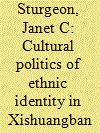|
|
|
Sort Order |
|
|
|
Items / Page
|
|
|
|
|
|
|
| Srl | Item |
| 1 |
ID:
095458


|
|
|
|
|
| Publication |
2010.
|
| Summary/Abstract |
This article investigates the practice and social meanings of cross-border journeys of Dai minority monks, in Xishuangbanna, Southwest China. These journeys play a vital part in Theravada revivalism in this border region. In the early 1990s, the Dai monks left Xishuangbanna to pursue their Buddhist studies in Thailand, thereby experiencing Thai culture and society. I will show not only that transnational networks among the Tai peoples in the upper Mekong region have played a crucial role in this religious movement, but also that the transnational Theravada networks enable and are partly constituted by the cross-border journeys of Dai exiles and minority monks, which strengthen and enhance the Dai ability to persist, revive, and maintain their locality and cultural identity. It is these cultural practices which contribute to and formulate the making of Dai places within the power contexts of state displacement, regional trade and development in Southwest China.
|
|
|
|
|
|
|
|
|
|
|
|
|
|
|
|
| 2 |
ID:
118422


|
|
|
| 3 |
ID:
124659


|
|
|
|
|
| Publication |
2013.
|
| Summary/Abstract |
Global processes and encounters with modernity have led to unique development patterns in ethnic minority areas in China. Rubber tree planting and rubber production, for example, have forged a link between tropical jungle villages like Mandi in Xishuangbanna (Yunnan Province) and China's booming car industry, and even the wider capitalist world system. As a result, the Dailue ethnic minorities in Mandi have experienced a social change from mechanical solidarity in rice agriculture to organic solidarity in market economic conditions. Such changes also expose Dailue society to increasing "modern" social risks, and this, in turn, has influenced religious practices. The traditional guardian spirit cults of the house (dubula hen), village (dubula ban) and region (dubula moeng) are held responsible for social risk management in Dailue culture. The increasing social risks have compelled people like the Dailue from Mandi to question and revisit the predicament of their folk religion, revealing the ongoing importance of spirit cults.
|
|
|
|
|
|
|
|
|
|
|
|
|
|
|
|
| 4 |
ID:
145128


|
|
|
|
|
| Summary/Abstract |
Following international trends to reform school management, the Chinese government has proposed school-based decisionmaking as a measure to raise the “quality” of education, but at the same time it has imposed new institutions of accountability for teachers and school administrators. In order to understand how this interplay between accountability and discretion affects Chinese educational reforms, this paper analyses policy implementation through the lens of decision-making by principals and teachers as street-level bureaucrats. In the case of minority-language education in Xishuangbanna, a subject where institutions provide comparatively large spaces for discretionary decisions, I argue that the current institutions on accountability in minority-language education in China trigger processes by which implementers must interpret vague institutions in order to make decisions for their classroom. These purposefully wide spaces of “interpretational discretion” enable the party-state to make good on its promise to support local diversity, without threatening its own authority to prescribe educational goals.
|
|
|
|
|
|
|
|
|
|
|
|
|
|
|
|
| 5 |
ID:
089776


|
|
|
|
|
| Publication |
2009.
|
| Summary/Abstract |
This article examines, both in internal and international contexts, the petition of the zhiqing in Xishuangbanna, Yunnan, during the 1978-79 transition. It first shows how a shortage of labour on Xishuangbanna state rubber farms led to the arrival of the zhiqing from other regions. It then reviews their lives and sufferings of these revolutionary youths, followed by an analysis of the petition in terms of its process and result. This article proposes three key reasons for the win-win result: the extraordinary leadership and organization of the zhiqing, factional struggles within the Chinese Communist Party, and the Sino-Vietnamese War. Finally, it attempts to fit this event into recent literature on mass resistance in contemporary China.
|
|
|
|
|
|
|
|
|
|
|
|
|
|
|
|
|
|
|
|
|